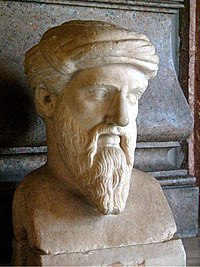Pythagoras
Pythagoras of Samos (Èdè Grííkì Ayéijọ́un: Ὁ Πυθαγόρας ὁ Σάμιος [O Puthagóras o Sámios] error: {{lang}}: text has italic markup (help) "Puthagoras the Samian", or simply Ὁ Πυθαγόρας O Puthagóras; c. 570-c. 495 BC[1])
| Pythagoras (Πυθαγόρας) | |
|---|---|
 Bust of Pythagoras of Samos in the Capitoline Museums, Rome | |
| Orúkọ | Pythagoras (Πυθαγόρας) |
| Ìbí | c. 570 BC Samos Island |
| Aláìsí | c. 495 BC Metapontum |
| Ìgbà | Ancient philosophy |
| Agbègbè | Western philosophy |
| Ẹ̀ka-ẹ̀kọ́ | Pythagoreanism |
| Ìjẹlógún gangan | Metaphysics, Music, Mathematics, Ethics, Politics |
| Àròwá pàtàkì | Musica universalis, Golden ratio, Pythagorean tuning, Pythagorean theorem |
Ipa látọ̀dọ̀
| |
Ìpa lórí
| |

|
Àyọkà yìí tàbí apá rẹ̀ únfẹ́ àtúnṣe sí. Ẹ le fẹ̀ jù báyìí lọ tàbí kí ẹ ṣàtúnṣe rẹ̀ lọ́nà tí yíò mu kúnrẹ́rẹ́. Ẹ ran Wikipedia lọ́wọ́ láti fẹ̀ẹ́ jù báyìí lọ. |
Itokasi
àtúnṣe- ↑ "The dates of his life cannot be fixed exactly, but assuming the approximate correctness of the statement of Aristoxenus (ap. Porph. V.P. 9) that he left Samos to escape the tyranny of Polycrates at the age of forty, we may put his birth round about 570 BC, or a few years earlier. The length of his life was variously estimated in antiquity, but it is agreed that he lived to a fairly ripe old age, and most probably he died at about seventy-five or eighty." William Keith Chambers Guthrie, (1978), A history of Greek philosophy, Volume 1: The earlier Presocratics and the Pythagoreans, page 173. Cambridge University Press